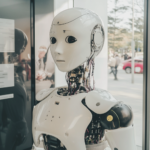In today’s rapidly evolving digital landscape, Artificial Intelligence (AI) stands as one of the most transformative forces. With its potential to redefine industries and reshape everyday life, AI is no longer confined to the realms of science fiction—it is now integral to the technological advancements of the 21st century.
The Evolution of Artificial Intelligence
The journey of AI spans several decades, marked by significant milestones that have paved the way for its current capabilities. Initially, AI was a concept confined to academic research, but with advancements in computing power and data availability, it has grown into a robust field with real-world applications.
The Beginnings
- In the mid-20th century, pioneers like Alan Turing laid the groundwork for AI by posing fundamental questions about machine intelligence.
- The development of the Turing Test highlighted the potential for machines to exhibit human-like intelligence.
Progress Through the Decades
- The 1980s and 1990s saw the rise of machine learning algorithms that could process data in more complex ways.
- By the early 21st century, deep learning and neural networks had emerged, allowing machines to process vast amounts of data with remarkable accuracy.
AI’s Pervasive Influence in Modern Technology
Today, AI permeates various facets of technological development, pushing the boundaries of what’s possible.
Healthcare
- AI-driven diagnostics have revolutionized healthcare, offering unparalleled precision in identifying diseases.
- Personalized medicine, powered by AI, tailors treatments to individual genetic profiles.
Finance
- In financial services, AI algorithms are crucial in risk assessment and fraud detection, ensuring a safer financial ecosystem.
- AI-powered chatbots and virtual assistants enhance customer service and streamline financial planning.
Transportation
- The advent of autonomous vehicles is a testament to AI’s role in transforming transportation, offering promising solutions for traffic management and accident reduction.
- AI algorithms optimize supply chain logistics, making transportation more efficient than ever.
Entertainment
- AI has also reshaped the entertainment industry, from personalized content recommendations to the creation of virtual environments in gaming.
- Machine learning algorithms analyze user preferences, delivering content tailored to individual tastes.
The Ethical Implications of Advanced AI
As AI continues to advance, its influence grows, raising important ethical considerations. The potential for AI to impact various socio-economic factors necessitates a thoughtful approach to its development and deployment.
Privacy Concerns
- The collection and analysis of vast amounts of personal data by AI systems pose significant privacy risks.
- Establishing regulations to safeguard data privacy is crucial in maintaining public trust.
Job Displacement
- The automation of tasks traditionally performed by humans raises concerns about job displacement.
- Efforts to reskill and upskill the workforce are essential in addressing these changes.
Bias and Fairness
- AI systems can inadvertently perpetuate and exacerbate biases present in training data.
- Creating transparent and fair AI models requires ongoing research and ethical scrutiny.
The Future of AI: Opportunities and Challenges
Looking forward, the future of AI is filled with both exciting opportunities and significant challenges. Its potential to create unprecedented value is tempered by the need to address various technical and ethical hurdles.
Opportunities
- Cross-industry Collaboration: AI can act as a catalyst for innovation across industries, fostering new business models and opportunities.
- Global Impact: AI-driven solutions have the potential to tackle pressing global challenges, from climate change to healthcare accessibility.
Challenges
- Regulation: Establishing a regulatory framework that balances innovation with safety and ethics is vital.
- Security: As AI becomes more integrated into critical infrastructure, ensuring its security against cyber threats is paramount.
In conclusion, artificial intelligence remains a powerful driver of technological change, offering immense potential to improve our lives. However, harnessing this potential responsibly requires collaboration between technologists, policymakers, and society at large. As we navigate this AI-powered future, the focus must remain on leveraging its benefits while addressing its challenges, ensuring it serves humanity’s best interest.








